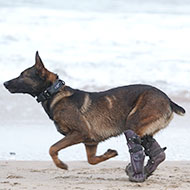
Kuno sustained severe injuries while saving the lives of British forces.
A military working dog who saved the lives of British insurgents during a deadly Al Qaeda attack is set to receive the prestigious PDSA Dickin Medal, the animal's equivalent of the Victoria Cross.
Three-year-old Kuno - who is also the first military dog in the UK to be fitted with custom-made prosthetic limbs - will receive his award during a virtual ceremony in November. The honour is the highest award any animal can achieve while serving in military conflict.
In 2019, Kuno and his handler were deployed to support specialist UK and host nation forces on a compound raid. The enemy was expected to be well-armed, well prepared and willing to fight to the death.
The Belgian Malinois and his handler were among the first off the helicopter. But as they charged across the ground towards the compound, they immediately came under fire and were unable to move. Without a second thought, Kuno bolted through the rain of bullets to tackle the gunman, breaking the deadlock and, ultimately, enabled British forces to successfully complete their mission.
Defence secretary Ben Wallace said: “Without Kuno, the course of this operation could have been very different, and it’s clear he saved the lives of British personnel that day. This particular raid was one of the most significant achievements against Al Qaeda in several years.”
During the attack, Kuno sustained serious injuries to both of his rear legs and was given immediate life-saving care on the back of the helicopter. One bullet had narrowly missed a main artery, and he needed several lifesaving operations in theatre before he was stable enough to return the UK.
Sadly, one of Kuno's rear paws could not be saved owing to the risk of infection. But an innovative and lengthy programme of rehabilitation followed and, under the care of army vets, veterinary nurses and canine physiotherapists, he was eventually able to restore function to his nerves and muscles.
Kuno remained friendly and enthusiastic throughout his treatment, and especially enjoyed his hydrotherapy sessions. Within months he was strong enough to be fitted with a pioneering custom-made prosthesis to replace his missing paw, alongside an orthotic brace to support his injured limb.
Kuno has since been rehomed and is said to be enjoying his retirement. Lightweight and fully bespoke, the prosthesis allows him to run and jump and will enable a fantastic quality of life for years to come.
Col Neil Smith QHVS, the chief veterinary and remount officer, said: “It is important that Military Working Dogs receive a high level of care if they are unfortunately injured, and Defence has military vets and vet nurses to ensure animals receive the care and rehabilitation they deserve.
“Kuno is an amazing dog in many ways, and we are delighted that the PDSA have decided to award him their Dickin Medal.”
Kuno will become the 72nd recipient of the PDSA Dickin Medal. Previous recipients include 34 dogs, 32 World War II messenger pigeons, four horses and one cat. PDSA Director General, Jan McLoughlin, said:
“Kuno’s heroic actions undoubtedly changed the course of the mission and saved lives. He took on the enemy without fear or hesitation, never faltering from his duty despite being seriously injured. For his bravery and devotion to duty, he is a thoroughly deserving recipient of the PDSA Dickin Medal and we look forward to formally presenting his award later this year.”



 The Veterinary Medicines Directorate (VMD) is inviting applications from veterinary students to attend a one-week extramural studies (EMS) placement in July 2026.
The Veterinary Medicines Directorate (VMD) is inviting applications from veterinary students to attend a one-week extramural studies (EMS) placement in July 2026.